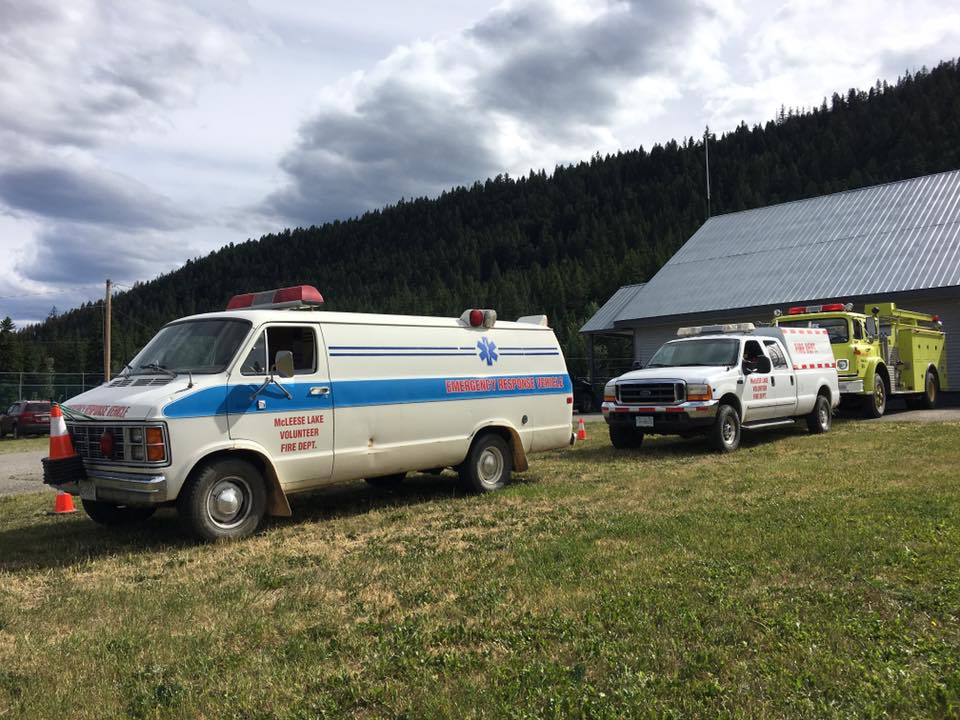With wildfires threatening communities throughout B.C., volunteer fire departments across the province have suddenly found themselves tested.

But what’s it like to be a part-time firefighter in a rural B.C. community, with the threat of a wildfire around every corner?
CKNW’s Steele & Drex spoke with Ian Hicks, president of the McLeese Lake Volunteer Fire Department to find out.
LISTEN: On the front lines of B.C.’s wildfires with a volunteer fire crew
McLeese Lake isn’t exactly a burgeoning metropolis. It’s located about one-third of the way between Williams Lake and Quesnel on Highway 97, and has a population of just under 150 people.
Operating a fire department there takes initiative, thrift and “gumption,” according to Hicks.
It has three vehicles: an ambulance, a fire truck and a small first responder truck.
“I call the ambulance Starsky and Hutch because it’s right out of the 1980s. But back in its day it was quite the thing,” Hicks said.
The ambulance was donated, and Hicks said the crew spent about $200 to fix it up and have decals added.
Hicks himself bought the fire truck to start the department five years ago.
“There was one for sale on the side of the highway and I thought, we’ve got to have this happen,” Hicks said.
Until then, he said, the community had been without any kind of first responder service – a challenge, given that calling an ambulance from out of town comes with an approximately 30-minute response time.
Hicks said the team has managed to pull together the bare minimum to meet the province’s regulatory requirements for a department; it survives on a shoestring budget by taking donations, selling burgers and collecting bottles and cans for fundraising purposes.
“We don’t have a fire hall, so what we do is we’re staged up in my chief’s front yard, which is just on the side of the highway right in downtown McLeese Lake,” he said.
The team has pulled together about $20,000 with the hope of one day building a permanent hall.
Into action
But the McLeese Lake department’s lack of resources hasn’t stopped it from hitting the front lines as the threat of a wildfire bears down.
Hicks said the team put out a grass fire in a farmer’s field this weekend that could have jumped the highway and cut off the key route upon which most evacuees rely when fleeing from the south.
“An hour’s worth of dilly-dallying around and that fire would have been unstoppable and come right across the field, and as of now we would have had no Highway 97,” he said.
“All of the people trying to evacuate would have been bottlenecked.”
Most of the crew works at the nearby copper mine, which has allowed them to turn their full attention to the fires. The mine even offered them free fuel – a necessity with no other source available nearby at the moment.
Hicks said fire activity within 15 kilometers of the town has died down, allowing the team to spare five volunteers to head out and help nearby ranchers deal with a small fire of their own which had grown to about 500 meters in size.
He said support has poured in from other communities. Most recently, a trailer from Fort McMurray showed up, loaded with fuel and firefighting gear.
“It was really emotional, after spending two or three days of really heightened anxiety levels over all this, and these guys showed up with a trailer and said ‘whatever you need, you take it,’” Hicks said.
“I tried to say thank you, and I got a bit choked up.”












Comments